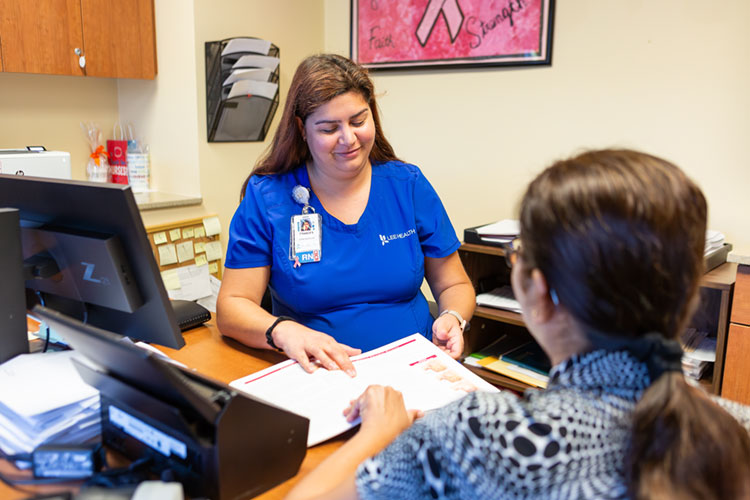

COURTESY PHOTO
Affecting one in eight women in the U.S. alone, breast cancer is the second most diagnosed cancer and the second leading cause of cancer death, according to the American Cancer Society. But there is also some good news regarding this disease. “With advancements in medicine and technology, more women are beating breast cancer and surviving a lot longer than they did years ago,” asserts Frances Hutchinson, RN, BSN, CBCN, a breast health nurse navigator at Lee Health Cancer Institute. “The treatments for breast cancer aren’t as invasive as they used to be, and there’s more support for women who develop this cancer than ever before.”
Lee Health is the largest public health system in Florida, and Frances is one of two breast health nurse navigators within the institute’s Breast Health Center. The other is Liz Bachoo-Garib, MSN, MHA, RN, OCN, CBCN. As nurse navigators, they provide ongoing support for women dealing with the diagnosis and treatment of breast cancer. “My main role is to coordinate the patient’s care to make sure they get to where they need to be,” Frances describes. “I initially meet with women following their breast biopsies. If their biopsy results are positive for cancer, I help the women get through the system smoothly. “Part of my job involves teaching newly diagnosed women about the disease and their treatment options. And I connect the women with the appropriate cancer specialists. My goal is to reduce barriers with regard to women’s breast cancer care.”
Reducing barriers includes connecting women who are uninsured or are unable to pay for their care. Frances also arranges transportation for women who have difficulty getting to the Breast Health Center for treatment and connects patients with support services such as licensed counselors, oncology-trained dietitians and the center’s breast cancer rehabilitation program. “I also provide preoperative education to women who are about to undergo a lumpectomy, which is the removal of the cancerous tumor from the breast, or mastectomy, which is the removal of the entire breast,” Frances informs. “These classes help prepare the patients for their surgery and explain what is involved with each procedure. “Further, I explain the general activity guidelines following surgery and teach patients stretches and exercises that promote healing. Another topic we explore is managing lymphedema, which is excessive swelling in the arms that can occur if nearby lymph nodes are removed during surgery.”


Jordan Pysz / iFoundMyDoctor.com Frances informs women who have received a breast cancer diagnosis about their treatment options.
Frances works primarily in the Breast Health Center’s diagnostic center. Liz facilitates the center’s multidisciplinary breast clinic. She is also involved with the many breast cancer research studies that are conducted at Lee Health Cancer Institute’s Regional Cancer Center. “In our multidisciplinary breast clinic, we work with physicians throughout the community to alert them to our program and provide an opportunity for their newly diagnosed breast cancer patients to access our system,” Frances explains. “During the patients’ initial appointment in the clinic, we bring together a breast surgeon, a medical oncologist and a radiation oncologist, who review everything involved in breast cancer treatment. “It is a long visit for the patients, but it is nice for them to meet the different doctors, learn which doctor does what and identify their next steps in the treatment process.” Frances offers advice for all women. “Know your body,” she offers. “If something doesn’t look or feel right with your breasts, see your doctor right away. Perform monthly self-exams to look for lumps or changes in your breasts, and get screening mammograms as recommended by your doctor. “The general recommendation is that women begin screening with yearly mammograms at age 40 if they’re at average risk. Women at high risk are typically advised to begin sooner, typically at age 35.”





Leave a Reply